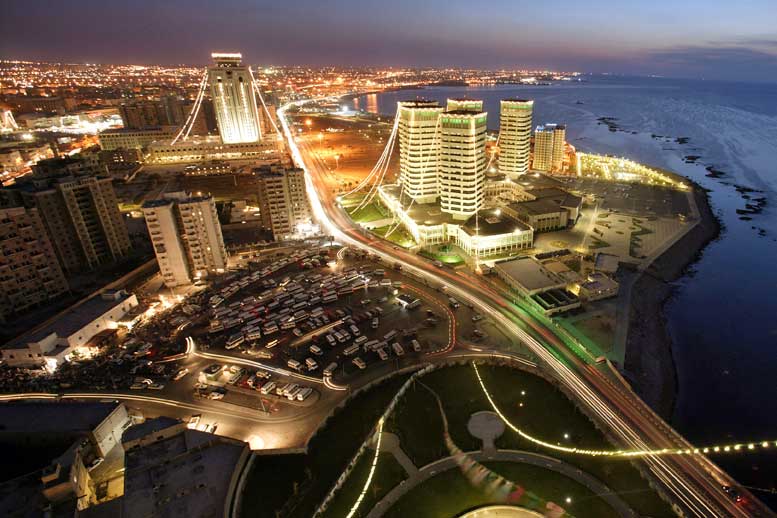Could someone repost those pics of Tripoli and list of benefits that were available to Libyan citizens when the evil dictator was in power.
In 2002, Libya had one of the highest per capita incomes in Africa, $7,600, and a relatively high population growth rate at 2.4 percent. Thanks to oil, the government provides generous welfare benefits to Libyan citizens and the economy relies heavily on foreign workers; in the 1980s and 1990s, more than half a million foreign nationals, mostly Africans, have found employment there.
The Libyan government structure was designed by Muammar al-Qaddafi (also Muʿammar alQadhdhafi), who holds no formal position of authority but serves as head of state. As he conceives it, Libyans rule themselves, without the intervention of elections, politicians, or political parties, through a system of local and national committees and congresses that deliberate, administer, and supervise the affairs of the country on their behalf.
Health care is a right guaranteed by the State to all Libyan citizens through the
creation of hospitals and health establishments in accordance with the law.
Subsidized food, free services in education and health, housing facilities, utility
services (electricity, water and transportation) at low prices to the poor are
among the benefits that eased the lives of all citizen
When a worker retires because an accident at work has totally disabled
him/her and made him/her unable to work again, he/she is entitled to a full
pension. If the accident causes partial disability, the worker is entitled to a
lump sum payment or partial pension.
Daily assistance in cash is provided to self-employed persons in the event of
temporary disability due to sickness, an employment accident or childbirth
Under the revolutionary leadership of Muammar Qaddafi, Libya has attained the highest standard of living in Africa. In 2007, in an article which appeared in the African Executive Magazine, Norah Owaraga noted that Libya, “unlike other oil producing countries such as Nigeria and Saudi Arabia, utilized the revenue from its oil to develop its country. The standard of living of the people of Libya is one of the highest in Africa, falling in the category of countries with a GNP per capita of between USD 2,200 and 6,000.”
“The young people are well dressed, well fed and well educated. Libyans now earn more per capita than the British. The disparity in annual incomes… is smaller than in most countries. Libya’s wealth has been fairly spread throughout society. Every Libyan gets free, and often excellent, education, medical and health services. New colleges and hospitals are impressive by any international standard. All Libyans have a house or a flat, a car and most have televisions, video recorders and telephones. Compared with most citizens of the Third World countries, and with many in the First World, Libyans have it very good indeed.”
Before the chaos erupted, Libya had a lower incarceration rate than the Czech republic. It ranked 61st. Libya had the lowest infant mortality rate of all of Africa. Libya had the highest life expectancy of all of Africa. Less than 5% of the population was undernourished. In response to the rising food prices around the world, the government of Libya abolished ALL taxes on food.
People in Libya were rich. Libya had the highest gross domestic product (GDP) at purchasing power parity (PPP) per capita of all of Africa. The government took care to ensure that everyone in the country shared in the wealth. Libya had the highest Human Development Index of any country on the continent. The wealth was distributed equally. In Libya, a lower percentage of people lived below the poverty line than in the Netherlands.
How does Libya get so rich? The answer is oil. The country has a lot of oil, and does not allow foreign corporations to steal the resources while the population starves, unlike countries like Nigeria, a country that is basically run by Shell.
Gadhafi became the leader of Libya in 1969. The living standards of Libyans have improved significantly since the 1970s, ranking the country among the highest in Africa. Urbanization, developmental projects, and high oil revenues have enabled the Libyan government to elevate its people's living standards. The social and economic status of women and children has particularly improved. Various subsidized or free services (health, education, housing, and basic foodstuffs) have ensured basic necessities. The low percentage of people without access to safe water (3 percent), health services (0 percent) and sanitation (2 percent), and a relatively high life expectancy (70.2 years) in 1998 indicate the improved living standards. Adequate health care and subsidized foodstuffs have sharply reduced infant mortality, from 105 per 1,000 live births in 1970 to 20 per 1,000 live births in 1998. The government also subsidizes education, which is compulsory and free between the ages of 6 and 15. The expansion of educational facilities has elevated the literacy rate (78.1 in 1998).


